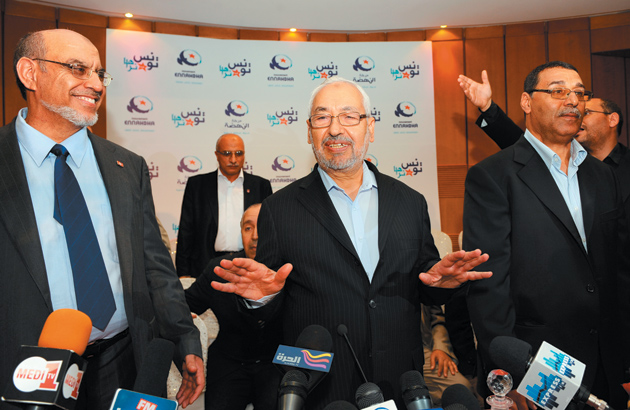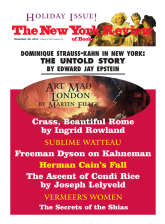Many of us were wrong about the Tunisian elections on October 23. The most important result was not so much the victory of the Islamist Renaissance Party, or Ennahda—which won 89 out of 217 seats in the Constituent Assembly that will write a new constitution for the country—but the desire of the Islamists to prove they had changed.
We have been dealing in Tunisia with a phase that we might well describe as a counterrevolution. I use the term “a phase” advisedly, because the most important event, in fact the only decisive one, will be the legislative elections that will take place after a year of debate in the new Constituent Assembly. A year is a long time. Anything can happen, and so it is a little late now for the proponents of a “modern” Tunisia to express disappointment and tell themselves that they just didn’t know their own people. (The Congress for the Republic Party, which represents such “modernists” and is led by the human rights activist Moncef Marzouki, came in second with twenty-nine seats and may join Ennahda in a ruling coalition.) The modernists can certainly reproach themselves—as can we along with them—for having underestimated both the share of votes achieved by the revolutionary Islamist party and also its ability to inflame the feelings and the imaginations of the Tunisian voters. No doubt, the modernists can just as reasonably reproach themselves for having failed to avoid the disarray caused by their divisions within a solidly conservative society.
What becomes of Islamism when the victorious Islamist party is trying to persuade us that it subscribes to democratic values? Clearly the elections were a case of the Tunisian people themselves calling a legal halt to a revolution that they originally conceived and that spread across the Arab world. The shock produced by Ennahda’s victory is just as substantial and meaningful as the shock of the revolution in Tunisia of January 2011. Perhaps the term we should use is not shock, but in certain sectors it is more like a wave of panic, while in others it’s a general sense of confusion. The reason is that every aspect of this episode has been ambiguous, uncertain, and unlikely.
First observation: the Tunisians have reminded us that an uprising against a tyrant, even a successful one, may not amount to a revolution against a religion. The Muslim Brotherhood in Egypt rejoiced in the belief that their Tunisian brothers had helped to advance their own Egyptian cause. Some Libyan leaders subsequently confirmed that their future government would be theocratic in nature and that they wished to be seen as “moderate” Muslims. It remains impossible to know the nature of that moderation, especially after the murder of Muammar Qaddafi. Last of all, in Algeria and Morocco, where the rulers, with great annoyance, heard constant harping on the “Tunisian model” of government, any signs of uneasy conscience have vanished and the men in power feel greatly reassured. In other words, the prospect of a Western-style democracy and complete freedom of religion now seems nothing but a fleeting memory. The mystique of loyalty to tradition has won out over the romanticism of the triumph of liberty.
A second observation has to do with the calculated ambiguity of the leader of Ennahda, Rachid al-Ghannouchi. A disciple of Nasser, Ghannouchi never hid his active sympathy for the doctrines of Hassan al-Banna, the Egyptian founder of the Muslim Brotherhood. When Ghannouchi founded his own Islamist movement in 1981, the year that Anwar al-Sadat was assassinated, he knew perfectly well that the Islamists were anything but advocates of democracy, even though it is now agreed that he renounced violence at a time when the fundamentalists in every Arab nation were expressing solidarity with a variety of terrorist movements. But we can no longer overlook the fact that these days Ghannouchi never tires of singing the praises of the Turkish government and the way it reconciles Islamic identity with the defense of civil liberties. He says that he intends to create the most democratic model of government in the Arab world.
Still, there are plenty of problems with the new persona that the leader of Tunisian Islamism is trying to shape. Two days before the elections, Ghannouchi himself named the minimum threshold of votes he expected to receive and resorted to threats, saying that he would not hesitate to order troops into the streets if those votes failed to materialize. The response of the interim prime minister, Beji Caid Essebsi, was exemplary. We can never sufficiently praise the way in which this man served his nation in circumstances that were certainly sensitive, and perhaps starkly dramatic, by insisting on fair elections.
Advertisement
Ghannouchi’s second misstep came on October 26, when he criticized the way in which Tunisians mix French and Arabic, thus sullying the sacred language of the Prophet. We should point out here that, in contrast with the founder of modern Tunisia, Habib Bourguiba, the second language that Ghannouchi speaks is English, not French. He is a member of the generation of Islamists who sought refuge in London, a city that was then commonly referred to as “Londonistan.” This defense of the Arabic language, which primarily takes the form of an indictment of the use of French, has occurred in many Islamist circles, particularly in Morocco.
Recently I wrote that the Islamists were the only victims of the former president, Zine el-Abidine Ben Ali. That was unfair to all the democratic and forward-looking opponents of President Ben Ali who faced imprisonment or persecution. The fact remains, however, that the enemies who were targeted most directly by Ben Ali were certainly the Islamists. Their terror attacks began long before the 1987 coup d’etat that resulted in the overthrow of the tottering president for life, Habib Bourguiba, who had also fought actively against them. At that time, and for a certain period thereafter, practically everyone in Tunisia was pleased to see Islamist terrorists hunted down and steadily eliminated.
A third observation: What is happening with the Tunisians in France? How are we to explain the fact that men and women who have chosen to live in a country other than their own, in many cases deciding to become a part of French society, and in some cases aspiring to sink deep roots in France, can cast votes back home for leaders who are as contrary as can be imagined to the spirit of their adopted place of residence? How can women who enjoy the full protection of the law on all levels while in exile in France not want those same laws to be applied in the land of their birth?
Here is what they say: no one, Ghannouchi least of all, is going to abrogate the law Bourguiba passed that outlawed polygamy and guaranteed women’s rights.
Of course, it should be recognized that part of the support for Ennahda and for other Islamist groups derives from both their charitable work and their social programs, which are often more effective than those of the Red Cross or governments. Such activities help explain, for example, why in the Parisian suburbs some 40 percent of Tunisians—the same as in Tunisia itself—voted for Ennahda.
Moreover, I think I understand that even though they enjoy living in a country that is certainly free, France is also a place where change is constant. They wish to preserve the opportunity to return home to the land of their birth, where much of life remains in keeping with tradition and where little fundamentally changes. The power of nostalgia, then, is greater than the need for freedom among many of the Tunisians who live in France. That is a sentiment that I have long observed almost everywhere around the world.
—Translated from the French by Antony Shugaar




